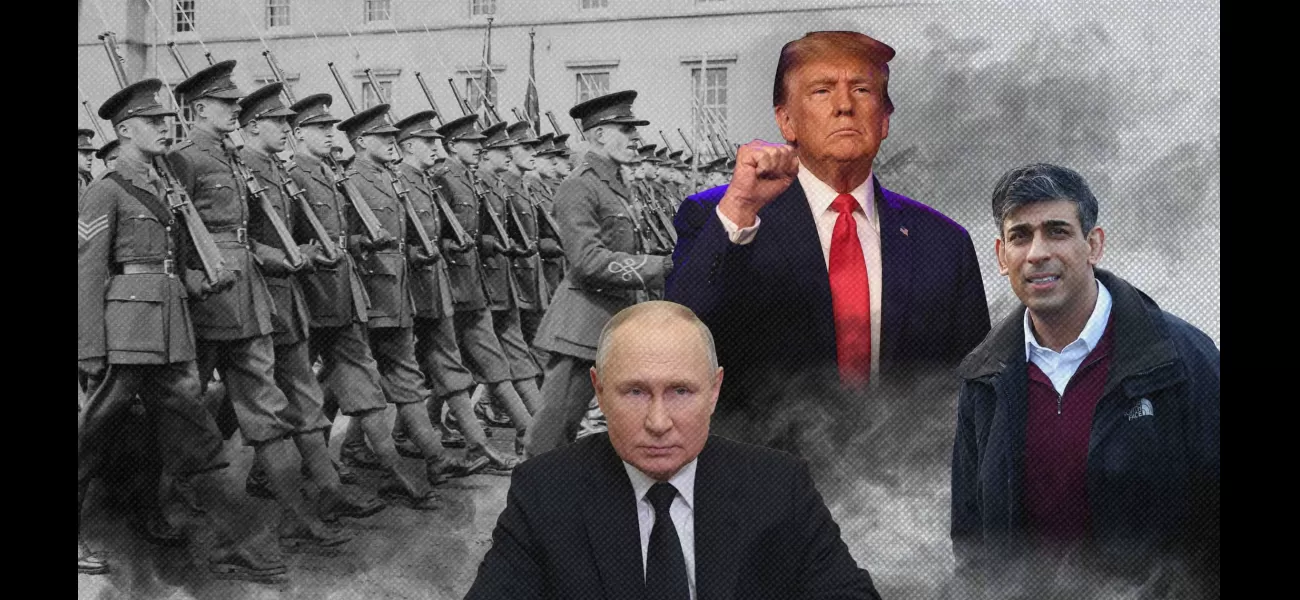The article discusses the possibility of conscription in Britain and the history of avoiding military service during wars.
Historical TV shows and documentaries often avoid the fact that many people were opposed to conscription.
February 18th 2024.

The possibility of World War Three has become a pressing concern for many individuals around the world. For those who take pride in defending their country during times of war and turmoil, the thought of fighting is a source of great honor. In the UK, we commemorate Remembrance Sunday and Armistice Day every year, showing great admiration for our veterans from World War II and other recent conflicts. Entertainment has also tackled this topic, with films like The Imitation Game and Saving Private Ryan, as well as numerous documentaries featuring testimonies from veterans and survivors of concentration camps. However, there is one aspect that is often not discussed - the uncomfortable truth about conscription.
Recently, the looming threat of World War III has resurfaced after a top British general suggested that conscription could be reintroduced due to the current size of our military being deemed "too small" in the event of a war against Russia. Meanwhile, Latvia has already implemented conscription for men aged 18 to 27, fearing a potential invasion by Russia. Tensions are also on the rise in Nato countries that share a border with Russia and Ukraine. However, the number of people who would refuse to be drafted today is significantly higher than during World War II, with many from Generation Z wanting nothing to do with it.
So what is the history of conscientious objection, also known as draft dodging, and what would be the consequences of conscription in 21st century Britain? During World War II, on the day that Britain declared war on Germany, parliament passed the National Service Act, which required all males aged 18 to 41 to register for service. Certain individuals, such as those who were medically unfit or working in key industries like farming and medicine, were exempt from conscription. However, in December 1941, all unmarried women and childless widows were also made liable for call-up, and the conscription age for men was increased to 51.
Many wartime dramas depict young men under the age of 18 trying to falsify their age or medical records in order to join the military and serve their country as soon as possible. However, this was not a common experience. In fact, during World War II, less than 60,000 men in Britain were classified as conscientious objectors. Those who refused to join the military had to appear before a tribunal to explain their reasons, and if their case was not dismissed, they were assigned non-combatant roles.
Historian and presenter of the Condensed Histories podcast, Jem Duducu, explains that although 60,000 may seem like a large number, it only accounted for about 2% of the 2.9 million service men and women in the British Army by 1945. He also clarifies that most conscientious objectors in the UK were not motivated by political beliefs, but rather religious reasons. The majority were Quakers, who adhere to the principle of pacifism and therefore could not bear arms against the enemy while staying true to their faith. This does not mean that they did not believe in the cause of the war, but rather that they could not participate in it.
One of the most famous conscientious objectors of World War II was an American man named Desmond Doss, who refused to fight on religious grounds. He is the only conscientious objector in American military history to receive the Medal of Honor, the highest military decoration for bravery. Doss was initially court-martialed for refusing to carry a weapon while serving in the infantry, but eventually, he was allowed to serve as a combat medic in the Pacific theater of the war. His story has been depicted in the movie Hacksaw Ridge. This serves as a reminder that not everyone is comfortable with the idea of killing others, but it does not make them any less patriotic.
In the current war in Ukraine, there is still a strong sense of duty among the population, with more than 10 million people remaining in the country. While not everyone may be on the front lines, they can still contribute in their own way, whether it be building drones, driving ambulances, or working in the fire department. This highlights the fact that there are many ways to serve one's country, and it does not always have to involve taking up arms.
The world is once again faced with the looming threat of a third world war. As tensions rise and countries prepare for the worst, the idea of fighting for one's country in times of war is a source of great pride for many patriots across the globe.
Here in the UK, we honor our veterans and their sacrifices every year on Remembrance Sunday and Armistice Day. We hold deep respect for those who fought in World War II and other conflicts, both past and present. This topic is also a popular subject in entertainment, with films like The Imitation Game and Saving Private Ryan, as well as numerous documentaries, exploring the war and the firsthand accounts of veterans and survivors.
However, there is one aspect of war that is often overlooked - the uncomfortable truth about conscription. While many willingly answered the call to defend their country, there were also tens of thousands who did not want to be forced into battle.
Recently, the discussion of conscription has resurfaced as a top British general warned that it may need to be reintroduced due to the current size of our military in the event of a war against Russia. And as tensions continue to escalate, neighboring Nato countries are also feeling the pressure, with Latvia recently introducing conscription for young men and Nato jets being scrambled multiple times as Russian missiles flew dangerously close to Poland.
During World War II, approximately 60,000 people in Britain were classified as conscientious objectors. These individuals, who refused to join the military, had to appear before a tribunal to explain their reasons and were then given non-combatant roles if their case was not dismissed.
Historian and presenter of the Condensed Histories podcast, Jem Duducu, explains that while this number may seem significant, it actually only accounted for about 2% of the 2.9 million service men and women in the British Army at the time. He also clarifies that the majority of these objectors were not motivated by political beliefs, but rather their religious beliefs, with many being Quakers who are pacifists by faith.
One of the most famous conscientious objectors of World War II was American soldier Desmond Doss, who refused to fight on religious grounds. Despite facing court martial and being enlisted in the infantry, Doss stood by his beliefs and eventually served as a combat medic in the Pacific theater. His story has since been immortalized in the film Hacksaw Ridge.
Duducu adds that it's important to understand that not everyone is comfortable with taking another person's life, but that does not mean they are any less patriotic. In countries like Ukraine, where the war is seen as necessary, there are still millions of people who support their country in other ways, whether it's building drones, driving ambulances, or working in the fire department.
In the face of a potential third world war, the topic of conscription and conscientious objection is once again at the forefront. As we remember the sacrifices of those who fought in the past, it's important to also consider the uncomfortable truth about war and the different perspectives that exist.
Recently, the looming threat of World War III has resurfaced after a top British general suggested that conscription could be reintroduced due to the current size of our military being deemed "too small" in the event of a war against Russia. Meanwhile, Latvia has already implemented conscription for men aged 18 to 27, fearing a potential invasion by Russia. Tensions are also on the rise in Nato countries that share a border with Russia and Ukraine. However, the number of people who would refuse to be drafted today is significantly higher than during World War II, with many from Generation Z wanting nothing to do with it.
So what is the history of conscientious objection, also known as draft dodging, and what would be the consequences of conscription in 21st century Britain? During World War II, on the day that Britain declared war on Germany, parliament passed the National Service Act, which required all males aged 18 to 41 to register for service. Certain individuals, such as those who were medically unfit or working in key industries like farming and medicine, were exempt from conscription. However, in December 1941, all unmarried women and childless widows were also made liable for call-up, and the conscription age for men was increased to 51.
Many wartime dramas depict young men under the age of 18 trying to falsify their age or medical records in order to join the military and serve their country as soon as possible. However, this was not a common experience. In fact, during World War II, less than 60,000 men in Britain were classified as conscientious objectors. Those who refused to join the military had to appear before a tribunal to explain their reasons, and if their case was not dismissed, they were assigned non-combatant roles.
Historian and presenter of the Condensed Histories podcast, Jem Duducu, explains that although 60,000 may seem like a large number, it only accounted for about 2% of the 2.9 million service men and women in the British Army by 1945. He also clarifies that most conscientious objectors in the UK were not motivated by political beliefs, but rather religious reasons. The majority were Quakers, who adhere to the principle of pacifism and therefore could not bear arms against the enemy while staying true to their faith. This does not mean that they did not believe in the cause of the war, but rather that they could not participate in it.
One of the most famous conscientious objectors of World War II was an American man named Desmond Doss, who refused to fight on religious grounds. He is the only conscientious objector in American military history to receive the Medal of Honor, the highest military decoration for bravery. Doss was initially court-martialed for refusing to carry a weapon while serving in the infantry, but eventually, he was allowed to serve as a combat medic in the Pacific theater of the war. His story has been depicted in the movie Hacksaw Ridge. This serves as a reminder that not everyone is comfortable with the idea of killing others, but it does not make them any less patriotic.
In the current war in Ukraine, there is still a strong sense of duty among the population, with more than 10 million people remaining in the country. While not everyone may be on the front lines, they can still contribute in their own way, whether it be building drones, driving ambulances, or working in the fire department. This highlights the fact that there are many ways to serve one's country, and it does not always have to involve taking up arms.
The world is once again faced with the looming threat of a third world war. As tensions rise and countries prepare for the worst, the idea of fighting for one's country in times of war is a source of great pride for many patriots across the globe.
Here in the UK, we honor our veterans and their sacrifices every year on Remembrance Sunday and Armistice Day. We hold deep respect for those who fought in World War II and other conflicts, both past and present. This topic is also a popular subject in entertainment, with films like The Imitation Game and Saving Private Ryan, as well as numerous documentaries, exploring the war and the firsthand accounts of veterans and survivors.
However, there is one aspect of war that is often overlooked - the uncomfortable truth about conscription. While many willingly answered the call to defend their country, there were also tens of thousands who did not want to be forced into battle.
Recently, the discussion of conscription has resurfaced as a top British general warned that it may need to be reintroduced due to the current size of our military in the event of a war against Russia. And as tensions continue to escalate, neighboring Nato countries are also feeling the pressure, with Latvia recently introducing conscription for young men and Nato jets being scrambled multiple times as Russian missiles flew dangerously close to Poland.
During World War II, approximately 60,000 people in Britain were classified as conscientious objectors. These individuals, who refused to join the military, had to appear before a tribunal to explain their reasons and were then given non-combatant roles if their case was not dismissed.
Historian and presenter of the Condensed Histories podcast, Jem Duducu, explains that while this number may seem significant, it actually only accounted for about 2% of the 2.9 million service men and women in the British Army at the time. He also clarifies that the majority of these objectors were not motivated by political beliefs, but rather their religious beliefs, with many being Quakers who are pacifists by faith.
One of the most famous conscientious objectors of World War II was American soldier Desmond Doss, who refused to fight on religious grounds. Despite facing court martial and being enlisted in the infantry, Doss stood by his beliefs and eventually served as a combat medic in the Pacific theater. His story has since been immortalized in the film Hacksaw Ridge.
Duducu adds that it's important to understand that not everyone is comfortable with taking another person's life, but that does not mean they are any less patriotic. In countries like Ukraine, where the war is seen as necessary, there are still millions of people who support their country in other ways, whether it's building drones, driving ambulances, or working in the fire department.
In the face of a potential third world war, the topic of conscription and conscientious objection is once again at the forefront. As we remember the sacrifices of those who fought in the past, it's important to also consider the uncomfortable truth about war and the different perspectives that exist.
[This article has been trending online recently and has been generated with AI. Your feed is customized.]
[Generative AI is experimental.]
0
0
Submit Comment





